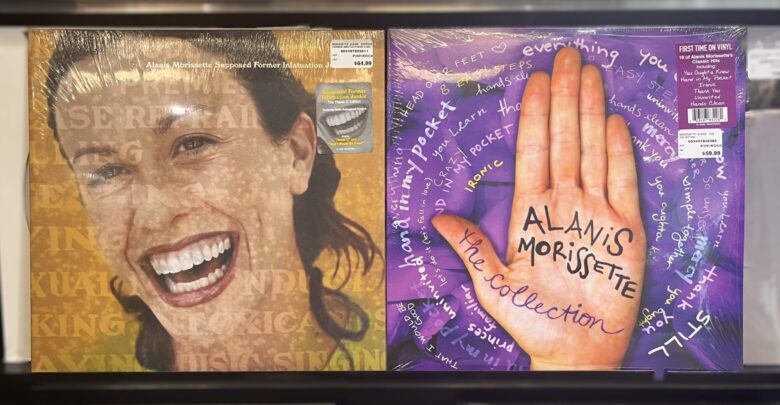 Leah Hennig
Leah HennigAlanis Morissette‘s legacy of feminism continues to empower and uplift younger generations, according to University of Alberta professor and pop culture critic Roxanne Harde. In 1995, Morissette released her album Jagged Little Pill which discusses many issues adolescents face, featuring Morissette’s “rageful” attitude, according to Harde.
Harde, a professor in the department of fine arts and humanities and chair of fine arts and humanities at the U of A’s Augustana Campus, discussed the “generational invitation” often required for younger people to find out about Morissette’s music.
The audience at Morissette’s shows is typically “comprised of many generations,” which Harde said she witnessed first-hand with her daughter and granddaughter the last time Morissette performed in Edmonton.
The crowd, in Harde’s experience, matches what is shown in old concert footage and videos.
“The majority [of people] were female and/or queer,” Harde said.
Harde explained that Morissette has a diverse demographic of fans, showing that many minorities relate to the themes of empowerment in her music.
In 2013, as part of the Festival of Ideas event, the U of A hosted a CBC interview about the “emergence of the female artist” with Morissette and Canadian author Margaret Atwood. Harde was asked to host a talk on pop culture, however, she had not originally planned to work on Morissette. Once she conducted research on the artist, Harde said she uncovered the ongoing relevance of Morissette’s work.
“It’s very clear she’s the boss,” Harde says
Harde explained that Morissette sat in the middle of the three seats, where the interviewer had planned to sit, and she conversed with Atwood, removing the interviewer from the conversation.
“She silenced him. She has taught generations of young women, but also young men, about feminism, about what this looks like,” Harde explained.
Morissette has always done what she has wanted to do, and in the process she has empowered young people everywhere, according to Harde.
Harde explained that Morissette has always communicated that women are capable. She summarized Morissette’s message about women as “let us do what we do, because we’re going to do it quite well.”
Morissette always had an all male band, yet she has featured female bands and soloists to open for her performances. This shows her “comfort leading a group of male musicians” while sharing the spotlight with other successful women. “It’s very clear she’s the boss,” Harde said.
During the COVID-19 pandemic in 2020, Morissette released her album Such Pretty Forks in the Road, which Harde described as “spa music.”
Her music style has adapted over the years, but her message remains: “be who you are, and you’ll be able to figure things out from there,” Harde said.
Morissette also evokes a sense of welcoming and inclusivity with her self-effacing style, for example, keeping all of her song titles in lowercase as an “invitation to move into the lyrics and [the] music,” Harde explained. By doing so, she “becomes more of a guide than a star.”
Themes in Morissette’s music still resonate with youth, Harde says
The personal evolution of the singer-songwriter has shaped her feminism and impact on her listeners. In the 2021 documentary Jagged, she opened up about the abuse she experienced at 15 in her relationship with her record producer.
Harde explained that it likely “took [Morissette] becoming a mother to understand that a 30 to 40-[year-old] person cannot be in an equitable relationship with someone who is 15.”
Jagged Little Pill is an album full of anger, which centres around issues adolescents face, but mostly stems from her break up, which was the catalyst for her to “manifest an entire matrix of feminist anger,” Harde said.
Morissette’s feminism continues to shape societal attitudes and foster a community of inclusivity, according to Harde. Particularly in terms of pride, she has communicated that we need to “embrace it and just let people be people,” Harde said.
Morissette continues to tell young girls to “claim their voices in their spaces,” to “take up space,” and to “not listen to the haters,” Harde explained.
The singer has also been influential in terms of body positivity. Many of her songs, such as “Mary Jane,” discuss eating disorders. When Harde attended the concert, she saw the slide show that played during these songs, which featured pictures of Morissette “at different weights, pregnant, [and] after pregnancy” with “messages [written on the slides] about body positivity.”
Harde reflected on Morissette’s journey, saying that from her years as a new artist and into the following decades, Morissette has been a relatable role model for everyone. Her message that encourages others to take up space, be themselves, and feel confident in their bodies continues to resonate with younger generations — working to bring together “angry feminists” of all ages, according to Harde.
CORRECTION: A correction was issued on July 18, 2025 at 3:45 p.m. to correct that Harde works in the department of fine arts and humanities, not the department of English and film studies. The Gateway regrets this error.




